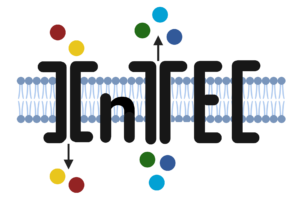Institutions
Collaboration is central to the success of InTEC !
Our team of pharmacologists, toxicologists, pharmacists, computational scientists, engineers, and clinicians provide complementary expertise and resources to reveal new placental transporter regulation and functions through integrated experimental, epidemiological, and modeling approaches.
Rutgers University

Investigators are conducting in vitro transporter assays to reveal novel regulation and function of placenta transporters as well as evaluating relationships between transporter proteomics and genetics and regulatory mechanisms in a healthy birth cohort using epidemiological modeling and chemical analysis. The Rutgers site is lead by Dr. Lauren Aleksunes (PI). At Rutgers, InTEC scientists include Dr. Emily Barrett, Dr. Nick Illsley (Placental Research Group, LLC), Dr. Brian Buckley, and Dr. Pam Ohman-Strickland, Dr. Chiharu Kuwata, along with trainees Dr. Rachel Buckley (postdoc), Michael Campbell (PhD Student), Bri Ames (PhD Student), Megan Hansel (PhD Student), Oindrila Paul (PhD Student) and Dr. Chenghui Jiang (PharmD/PhD Student).
University of Pennsylvania

Investigators are applying novel bioengineering approaches to construct and validate microphysiological systems to simulate maternal-fetal transfer through a series of human placentas-on-a-chip. The most recent chip model includes primary cells from healthy, term placentas and a 3D network of capillaries that self assemble to form a fetal vasculature. These chips are a highly novel translational tool to study the human placental barrier. The UPenn site lead is Dr. Dan Huh (PI) and Visiting Scientist Dr. Sejeong Kim. Dr. Pouria Fattahi has now transitioned to Assistant Professor at the University of Georgia.
Tulane University

Investigators are applying advanced cheminformatic and machine learning approaches to in vitro transporter datasets to define the binding characteristics of substrates and inhibitors and make predictions about novel interactions for further experimental validation.Their approach capitalizes on big data with millions of data points to develop new computational models that are publicly available at Toxiverse. The Tulane site lead is Dr. Hao Zhu (PI). Trainees and scientists include Nada Daood (PhD student), Tong Wang (Visiting Scientist), and Sean Carey (PhD student).
University of North Carolina

Investigators are using quantitative targeted absolute proteomics to define the transporter proteome in human placentas and placental-derived extracellular vesicles in the circulation during pregnancy. Their team is particularly interested in how diseases such as gestational diabetes impact the placental barrier. The UNC site lead is Dr. Jacqueline Tiley (Subcontract PI) along with InTEC investigators Dr. John Fallon and Dr. Kim Brouwer. Trainees include Nicole Chang (PharmD Student).
University of Rochester

Investigators at the University of Rochester oversee the Understanding Pregnancy Signals and Infant Development (UPSIDE) birth cohort. This longitudinal study include ~300 mother-child dyads who enrolled in their first trimester UPSIDE is designed to study maternal prenatal psychological distress and child health. UPSIDE’s key design elements including (1) serial maternal questionnaire and biomarker data across all trimester and (2) pediatric visits at seven time points from birth to 4 years old, allow researchers to examine multiple exposures impacting maternal and child health. The site lead is Dr. Thomas G. O’Connor (Subcontract PI).

InTEC invites affiliate members working on human placenta physiology, pharmacology, and toxicology to participate in center activities and research initiatives. Affiliate members include Dr. Phoebe Stapleton, Dr. Zorimar Rivera-Nunez, Dr. Elana Elkin, and Dr. Ellen Francis. Anyone interested in becoming an affiliate member of InTEC should contact Dr. Lauren Aleksunes.